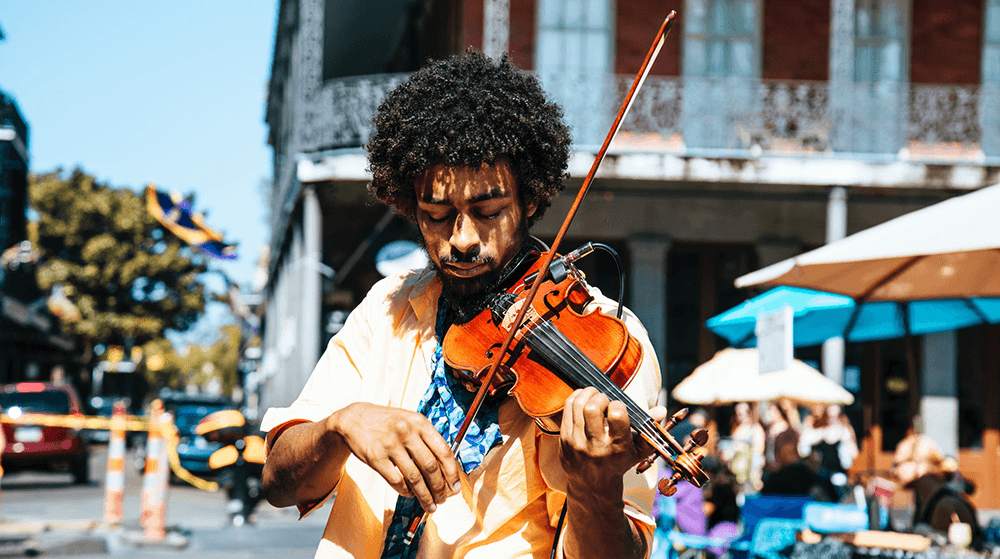How Music Helps You Unlock Your Creativity
Creativity is the key to inventing new ideas, artwork, and products. Music turns out to be a creative force by helping you enter Flow States.
Steven Puri
Save time with Sukha
The Creative Brain
Creativity is the key to inventing new ideas, artwork, and products. Music is a creative force that helps you enter Flow States, a psychological phenomenon that turns off the parts of your brain that stop you from applying creative solutions.
In scientific lingo, creativity is called transient hypofrontality; unsurprisingly, this brain state is similar to a Flow State. Utilizing fMRI technology, scientists observe brains organizing their frontal lobes in order to “meander.”
Meandering is important, according to Arne Dietrich from American University in Beirut, the professor who coined the term ‘hypofrontality.’ Like your body, your mind needs space to roam. Neurologically speaking, less is better.
An uncluttered mind is a creative mind.
University of New Mexico research professor and neurosurgeon Rex Jung explains,
It’s not shutting down as much, but it’s allowing a freer interplay of different networks in the brain so that the ideas literally can link together more readily.
Think of it as an unfocused walk in the park that subsequently offers you the mental space to focus. If you’re always “on,” there’s never time to breathe. Meandering frees up space so that when your attention is needed, you have the cognitive training to do so.
You have to build times for meandering into your schedule: aimless evening walks, lying back with your favorite record and drifting, sitting and thinking—no goal, no objective, going along for the ride your brain is leading.
American neurologist and creativity researcher Alice Flaherty says being creative is not a passive process.
Creative people are more responsive to sensory stimulation, have higher baseline levels of arousal, and exhibit increased goal-directed behavior.
In Flaherty’s model, people vary in terms of their level of creative drive according to the activity of the dopamine pathways in their emotional brain system.
Stimulating that pathway is key, and music is an important stimulant.
Music Matters
Dopamine is a “feel good” neurotransmitter, yet it accomplishes much more than physical pleasure. By accessing the dopamine pathway, the neurotransmitter is responsible for boosting concentration, promoting relaxation, fueling motivation, and igniting creativity—all tasks that music helps you achieve.
You have to access the right brain state in order to Flow. Neuroscientist Daniel Levitin believes music is one of the greatest ways to enter “mind-wandering mode," the very brain state that unlocks creativity. While in this mode, you’re able to come up with innovative and creative solutions.
Mind-wandering is the perfect counterpart to sustained focus. As it turns out, music influences both of these states.
Volume matters.
A 2012 study found that exposure to a moderate level of ambient noise (around 70 decibels) enhances abstract thinking and performance on creative tasks compared to low (50 dB) and high (85 dB) levels of noise. Seventy dB is about as loud as a washing machine, 50 dB is comparable to rainfall, and 85 dB is roughly equivalent to “average traffic.” You want to find a volume that influences your brain state but that doesn’t overwhelm your nervous system.
Once you find the sweet spot, press play and Flow.
Play Time
Let’s play a game to engage your creative mind.
In a simple experiment, Texas A&M University professor Stephen Smith presented volunteers picture-word puzzles that suggest common phrases. He then asked them to solve as many as possible. For example, they were asked to identify the phrase indicated in the following set of words:
You Just Me
The answer: Just between you and me.
Try three more:
Sale Sale Sale Sale
Stand
I
Bro Ken
The answers: For sale; I understand; broken in half.
Here’s why it matters: If any puzzle was unsolved, the volunteer was instructed to relax for 15 minutes and try again. More than one-third of the puzzles were solved on the second attempt.
A moment of calm between focused sessions helped volunteers think more creatively.
We need relaxation breaks in order to be creative and become efficient problem solvers. Our bodies and minds need a chance to recharge. Music also helps in this regard.
We are at our most creative when we combine inspiration and relaxation. Relaxing activities are a reliable strategy for creativity. When people feel at ease, they are more likely to explore novel and creative ways of thinking.
